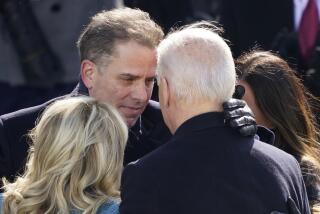Enron Tax Payments Are Probed
- Share via
WASHINGTON — A Senate committee moved Friday to answer one of the stubborn questions surrounding Enron Corp.’s collapse: Did the energy giant pay federal income taxes, or did it use off-shore shelters and accounting tricks to avoid Uncle Sam?
Enron has insisted that it paid $112 million in taxes in 2000, but an analysis this year by the advocacy group Citizens for Tax Justice claimed Enron paid nothing, thanks largely to a tax provision that permits giant deductions for issuing employee stock options.
On Friday, Sen. Max Baucus (D-Mont.), chair of the Senate Finance Committee, launched a formal investigation after Enron said it would waive federal confidentiality rules so that its tax returns can be discussed publicly at hearings or in committee reports.
“This investigation will be a thorough and comprehensive probe to gather the facts surrounding Enron’s abrupt downfall to determine whether Enron may have engaged in aggressive tax planning to improperly avoid paying federal income taxes or exploited loopholes in our tax system requiring attention,” Baucus said.
He ordered the Joint Committee on Taxation to spearhead the inquiry, which is expected to take several months. The committee also will review whether Enron’s compensation plans, some of which received substantial tax benefits, adequately protected workers.
In a letter to the committee Thursday, Enron attorney Fred T. Goldberg Jr. said the company agreed to waive its confidentiality rights with the understanding that its tax returns would be used to address broader tax policy issues.
“We understand that the committee is interested in determining whether there are, in the events that gave rise to Enron’s bankruptcy, significant tax policy issues of relevance beyond Enron’s particular circumstances such that they may need to be addressed through changes to the federal tax laws,” Goldberg wrote.
An Enron spokeswoman cautioned that the company does not have tax records for some of the off-the-books partnerships, which were controlled by former employees. Nor can Enron waive confidentiality rules for outside partnerships, she said.
Enron’s use of deductions for issuing stock options is already drawing scrutiny from lawmakers. Under current tax rules, companies may take deductions for the expense of issuing stock options, even if they don’t report the expense on their income statement.
Sen. Carl Levin (D-Mich.) has introduced a bill--opposed by many business groups--that would require companies to treat stock options similarly on their tax returns and income statements.
Sens. Joseph I. Lieberman (D-Conn.), chairman of the Senate Governmental Affairs Committee, and Fred Thompson (R-Tenn.) plan to send a letter to the Securities and Exchange Commission, Federal Energy Regulatory Commission, Commodity Futures Trading Commission and Labor Department, seeking records about any complaints they received about Enron and any communications between the agencies and the company and its auditor, Andersen.
Also Friday, Enron disclosed that former Chairman Kenneth L. Lay sold $20 million in Enron stock in the three weeks after he was warned by Sherron S. Watkins in August that the company might collapse amid accounting scandals, the Wall Street Journal reported on its Web site.
The company had earlier disclosed that Lay sold blocks of 1,000 to 4,000 shares, worth a total of $29.9 million, almost every day last year through July. Lay’s sales of Enron stock totaled $100 million, the company said Friday.
Documents were released showing that Lay wrote repeatedly to then-Texas Gov. George W. Bush, seeking support for legislation benefiting the energy giant.
Many letters concerned utility deregulation and tort reform. About 350 pages of correspondence were released by state archivists.
Although Bush signed a law deregulating the electricity market in 1999, the documents do not appear to show that Bush responded in print to Lay’s interest in the issue.
*
Times staff writer Richard Simon contributed to this report, and Associated Press was used in compiling it.
More to Read
Inside the business of entertainment
The Wide Shot brings you news, analysis and insights on everything from streaming wars to production — and what it all means for the future.
You may occasionally receive promotional content from the Los Angeles Times.










